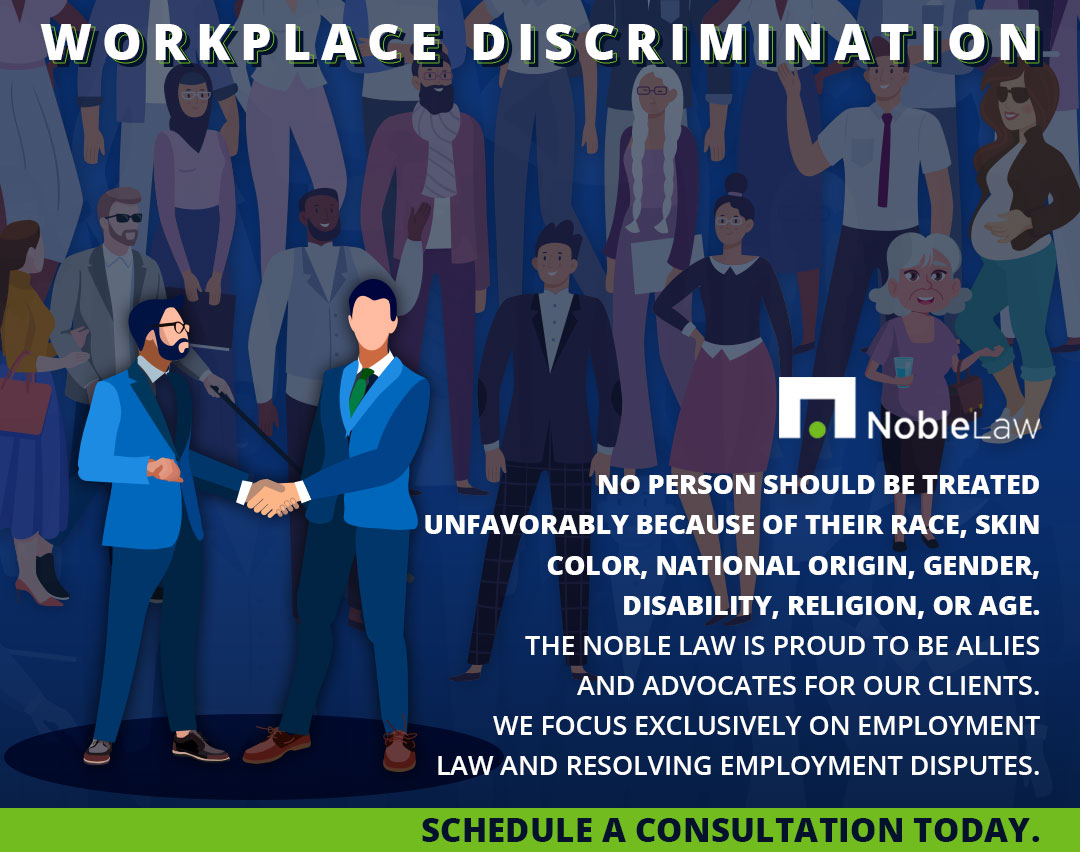Every employee has the right to a safe work environment that is free from illegal discrimination. This right is protected under state and federal anti-discrimination laws. If your workplace has become hostile and you are being unfairly targeted on the job, we can help.
As a nation, we have made significant strides toward workplace equality, but we still have far to go. Raleigh employment law attorneys at The Noble Law understand the dramatic toll that workplace discrimination and retaliation can take on your career, your finances, and your emotional well-being. Our team can help bring an end to unlawful treatment from your employers and achieve the resolution you deserve.




What is Workplace Discrimination?
Workplace discrimination, or employment discrimination, occurs when an employee or job applicant is treated differently or unfairly at work. It takes many forms and can impact hiring, firing, promotions, compensation, training, and disciplinary action. It is illegal to discriminate against someone in the workplace based on their:
- Age (under the federal Age Discrimination in Employment Act or ADEA)
- Citizenship status (if they have work authorization)
- Color
- Gender identity
- Disability (under the Americans with Disabilities Act or ADA)
- Genetic information (under the Genetic Information Nondiscrimination Act or GINA)
- Military status or service (under the Uniformed Services Employment and Reemployment Rights Act of 1994 or USERRA)
- National origin
- Race
- Sex (including pregnancy and childbirth)
- Sexual orientation
Generally, state and federal anti-discrimination laws regarding the above-listed “protected classes” apply to companies with 15 or more employees. The prohibitions against discrimination for citizenship status and military service apply to all employers. However, there are exceptions, and the laws can be nuanced. If you have questions about your situation, Triangle workplace discrimination attorneys at The Noble Law can review your case and explain your rights.


How Our Workplace Discrimination Attorneys Can Help You
Our workplace discrimination lawyers in the Triangle give your case the time and attention it deserves. We carefully review your situation and explain your rights and legal options, so you can make informed decisions about your claim.
If an informal resolution with your employer is not possible, we are fully prepared to move forward through the appropriate government agencies and the courts. We know what it takes to build a compelling claim, and we are committed to resolving your case and holding perpetrators accountable under the law.
Key Anti-Discrimination Laws
The North Carolina Equal Employment Practices Act (EEPA) gives private employees in protected classes the right to seek, obtain, and hold employment without discrimination. The North Carolina Occupational Health and Safety Act protects against discrimination based on race, sex, national origin, and religious affiliation.
Title VII of the Civil Rights Act of 1964 (Title VII) is the foremost federal legislation that makes it illegal to discriminate against a person because of their race, color, religion, national origin, or sex. It also prohibits retaliation against someone who reports workplace discrimination or participates in a discrimination investigation or lawsuit.


Common Types of Workplace Discrimination
Workplace discrimination takes many forms and it’s not always easy to determine if an action is unlawful. Perpetrators of workplace discrimination can often be quite subtle in an effort to go undetected, making it more challenging to detect harassment.
Unlawful workplace discrimination can take the form of:
Unfair Treatment
Unfair treatment refers to actions at work that are not based on job duties or performance—but rather who you are as a member of a protected class. It can be anything from not hiring you or passing you over for a promotion, to spreading rumors about you or transferring, demoting, or terminating you without disciplinary protocols.
Harassment
Unfair treatment can escalate to the point of harassment. This is unwelcome conduct based on membership in a protected category where:
- Enduring the behavior becomes a condition of employment, or
- The conduct is so severe it creates an intimidating, abusive, or hostile environment.
Offensive name-calling, slurs, ridicule, mockery, and physical threats or assaults are all examples of harassment.
Denial of a Reasonable Accommodation
Under certain circumstances, the law requires employers to provide reasonable accommodations for workers based on a disability or religious belief. Denial of a reasonable workplace change may constitute illegal workplace discrimination.
Retaliation
Unfortunately, job discrimination often goes unreported because victims and bystanders are scared to lose their job. Numerous laws provide remedies in the event of discipline, termination or other discrimination for speaking out against workplace discrimination or being involved in an investigation or lawsuit for these actions.
It’s a common misconception that workplace discrimination only occurs between a boss and their employee. That is not always the case. It can happen up and down the chain of command, among people in all positions, including colleagues, clients, and customers. Employers have a duty to protect employees from such discrimination.
Steps to Take When Facing Workplace Discrimination
Most companies have specific procedures for reporting workplace discrimination. They can usually be found in your employee handbook or employment agreement.
Employees can also file a Charge of Discrimination with the Equal Employment Opportunity Commission (EEOC.) This is the federal agency tasked with investigating discrimination complaints. You can contact the EEOC online, by phone, or in person.
https://www.eeoc.gov/federal-sector/filing-formal-complaint
You (the charging party) must provide the details of your employment and the discriminatory behavior (adverse employment action) before the agency will investigate your claim.
Some claims are resolved at this point through mediation, settlement, or conciliation. Possible remedies include:
- Back pay
- Court costs and attorney’s fees
- Hiring or re-hiring
- Promotion
- Reasonable accommodation
A weak or incomplete complaint is more likely to be dismissed. If your charge is dismissed, you will receive a “right to sue” notice and you have 90 days to take legal action against your employer in state or federal court.
You don’t have to go it alone when it comes to taking on your employer in a workplace discrimination claim. The law is on your side, and so are the attorneys at The Noble Law. We have offices in the Triangle Region and represent clients throughout North Carolina and South Carolina. Call or connect online to schedule a case consultation at our location closest to you.

Learn More
The Noble Law is committed to educating our communities in North Carolina about employment law. We believe that one of the first steps to a more equitable workplace is for employees to understand their rights. And we also believe that part of our job as employment lawyers is to share what we know with others. Explore our resources, including more employment law videos, and keep up with our employment law firm news by following Noble Notes.
Along with representing clients in the area of workplace discrimination, we also provide legal counsel to clients with claims of workplace harassment, executive compensation disputes, retaliation and whistleblower, and pay, overtime, and leave cases. Learn more about our law firm on our Practice Area page and if you’re interested in speaking with one of our employment lawyers, contact us today.


